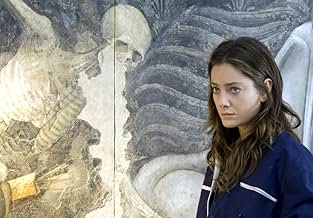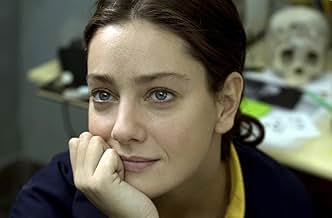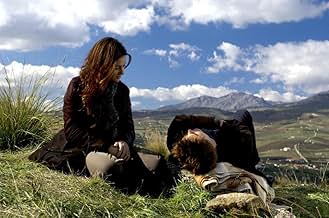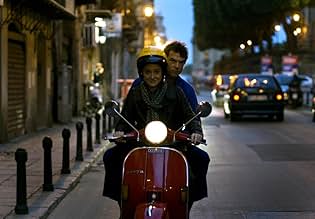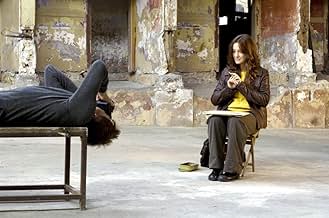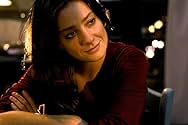Palermo Shooting
- 2008
- 2h 4min
CALIFICACIÓN DE IMDb
6.1/10
3.3 k
TU CALIFICACIÓN
El desenfrenado estilo de vida de un joven y famoso fotógrafo alemán casi lo mata. Decide ir a Palermo, Sicilia, para tomarse un descanso. ¿Podrán la hermosa ciudad y una atractiva mujer loc... Leer todoEl desenfrenado estilo de vida de un joven y famoso fotógrafo alemán casi lo mata. Decide ir a Palermo, Sicilia, para tomarse un descanso. ¿Podrán la hermosa ciudad y una atractiva mujer local ayudarle a calmarse?El desenfrenado estilo de vida de un joven y famoso fotógrafo alemán casi lo mata. Decide ir a Palermo, Sicilia, para tomarse un descanso. ¿Podrán la hermosa ciudad y una atractiva mujer local ayudarle a calmarse?
- Dirección
- Guionistas
- Elenco
- Premios
- 1 premio ganado y 2 nominaciones en total
- Dirección
- Guionistas
- Todo el elenco y el equipo
- Producción, taquilla y más en IMDbPro
Opiniones destacadas
I just saw the movie in International Film Festival of Durrës, eager as I was for another Wim Wenders experience. And I left the theater with mixed feelings. Images were so good, bur the story was so cheap. The apology of Death at the end of the movie was awful, as if written by a 15 years scholar. So was the dialogue with the shepherd. Cheap and cliché ideas about death and life. The presence in the story of G. Mezzogiorno was senseless and not justified at all. The story of a photographer that takes a shoot of Death, is not bad, whatsoever. But it surely didn't to be treated as in child books, with death coming towards you and moralizing about life and death. And above all, the pregnant Milla, pretending deeper art in VIP Photo shooting, gave a sense of pity. No worth seeing it twice.
image - still and moving - digital - film - panorama - window - painting. how is the world described in photographic/image capture? who sees? framing. who is seeing? what is seen? what is shown? dreams. i am a camera. this is maybe an over extension of the metaphor, but clearly states the idea of the seer seeing. audience. and the seer showing. story through experience, not always linear or real. and always - great views of the city. great mix of language & languages. vision. so much feeling, showing and not telling. faces, moments, real, unreal... "I watch it for a little while = I love to watch things on TV" this was interesting to see in las vegas, of all the places in the world.
A big-budget feature film version of a mixtape: the conceit of letting the audience hear what the protagonist's personal playlist sounds like in their head when they wear their earbuds was executed very well by the seemingly arbitrary song selection to juxtapose with the action. It never felt like a "music video" yet this film has the look and all the trappings. I've been a fan of Wim Wenders for a long time but I somehow missed this one on its first release. The dream sequences are quite unique and effective; this film is Wenders as a cinema stylist. The film has an advertising gloss with the kind of patchwork of collage. I had no expectations coming into the film but I knew that I wasn't in the mood for anything intense. I got want I wanted. It's a visually stunning but understated trip-to-Italy film and I felt like I discovered a hidden gem. A must for any fan of Lou Reed; a decade later perhaps it's time to re-watch Palermo Shooting.
Finn (Campino) is a German photographer. He is highly successful in his profession, but not in life. He can't quite put his finger on it, yet there's something missing and he is overwhelmed by dark thoughts. He decides to spend some time in Italy as an attempt to escape.
Palermo Shooting is a movie heavy on symbolism and with a clear philosophical orientation, a meditation about life and death. However, its good looks are its strongest asset. The setting is once again in the spotlight for Wim Wenders, first beautiful Palermo and then the gorgeous landscapes of a small Italian village.
The main character's interactions with Death are reminiscent of Bergman's The Seventh Seal, while his subjective way of experiencing reality and the use of special effects has a clear touch of German expressionism.
It's easy to tell this was a very personal project for Wim Wenders, but still not everything works. The philosophical aspect isn't that interesting or original, the dialogue leaves a lot to be desired, the soundtrack felt a bit off.
Palermo Shooting is a movie heavy on symbolism and with a clear philosophical orientation, a meditation about life and death. However, its good looks are its strongest asset. The setting is once again in the spotlight for Wim Wenders, first beautiful Palermo and then the gorgeous landscapes of a small Italian village.
The main character's interactions with Death are reminiscent of Bergman's The Seventh Seal, while his subjective way of experiencing reality and the use of special effects has a clear touch of German expressionism.
It's easy to tell this was a very personal project for Wim Wenders, but still not everything works. The philosophical aspect isn't that interesting or original, the dialogue leaves a lot to be desired, the soundtrack felt a bit off.
This is easily Wim Wender's most pretentious movie to date, and that's saying a lot given that Wenders is perhaps the most pretentious director of his generation. There is so much symbolic Mumbo-Jumbo I don't know where to begin: Dungeons. Coffins. Dead people. Ghosts. Including Lou Reed as a black-and-white specter of himself. Flocks of sheep. A shape-shifting city skyline. Hooded strangers, shooting arrows and causing crashes. All of which I have seen before, and with more panache: In "Dark City", in Cronenberg's "Crash", Paul Auster's "Lulu on the Bridge", Tom Tykwer's "Winter Sleepers", even in TV's "Lost". I'm not even mentioning "The Devil's Advocate". At the height of his self-importance, Wenders has Dennis Hopper, in the part of Death himself, make a speech about the merits of analog photography. Sounds ridiculous? Go figure. But the weakest link is Wender's choice of Campino as photographer Finn Gilbert, the lead character. Campino, a German rock star in his day job, may be photogenic in an aging toy boy way, but an actor he sure is not. Anything he says sounds like a line from a script, and the script is weak enough to begin with. Wenders asks too much of him, and too little of his co-lead Giovanna Mezzogiornio, a fine actress restricted to sleepy smiles and sullen glances in this movie. Charming guest appearances by Jana Pallaske as a feisty arts student, Inga Busch as a sexy swimming instructor in Ugg boots and a bathing suit, and by the divine Milla Jovovich as her glamorous self. Nice enough soundtrack, featuring Bonnie Prince Billy, Nick Cave, and The Velvet Underground. Watch with your eyes closed.
¿Sabías que…?
- TriviaThe film marks the first time that Director Wenders shot a movie in his hometown, Düsseldorf.
- ErroresIn the scene, when Finn talks with lady photographer, they discuss the age of their cameras. He tells that his Plaubel is twenty years old and she tells that her Leica is 40 years old. Actually she has Leica M7, which slightly differs from older Leica cameras. This camera marketed only in 2002.
- ConexionesFeatured in Dennis Hopper: Uneasy Rider (2016)
- Bandas sonorasDream (Song for Finn)
Written by Nick Cave and Warren Ellis
Performed by Grinderman
Published by Mute Song Ltd. 2008
Courtesy of Cave/Ellis 2008
Selecciones populares
Inicia sesión para calificar y agrega a la lista de videos para obtener recomendaciones personalizadas
- How long is Palermo Shooting?Con tecnología de Alexa
Detalles
- Fecha de lanzamiento
- Países de origen
- Sitios oficiales
- Idiomas
- También se conoce como
- Palermo'da yüzleşme
- Locaciones de filmación
- Productoras
- Ver más créditos de la compañía en IMDbPro
Taquilla
- Total a nivel mundial
- USD 580,203
- Tiempo de ejecución
- 2h 4min(124 min)
- Color
- Mezcla de sonido
- Relación de aspecto
- 1.85 : 1
Contribuir a esta página
Sugiere una edición o agrega el contenido que falta


